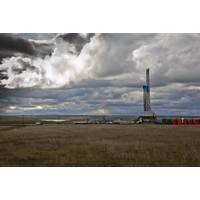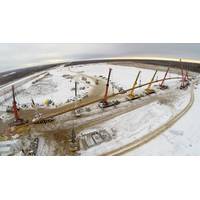'This could be the one that gets me,' Says Oilfield Service Veteran

Tim Harris was preparing to relocate for an assignment with energy services firm Halliburton Co for the fifth time in 15 years when his career came to a halt.A third-generation employee, Harris rose through the ranks at the top shale-oil services provider to oversee oilfield crews. He sailed through several busts, with the exception of a 9-month break in 2016.But April's historic price crash, which has left U.S. crude prices down 50% since January, put him and tens of thousands of oil service veterans out of work.
Facebook's Zuckerberg Drills Down into North Dakota's Oil Patch

Facebook Inc Chief Executive Mark Zuckerberg toured a North Dakota drilling rig on Tuesday and peppered industry workers in the No. 2 U.S. oil-producing state with questions about automation, safety and fracking. The visit to North Dakota, which pumps about 1.1 million barrels of oil per day - more than some OPEC members - is part of Zuckerberg's plan to tour all 50 states this year and learn about their local economies and communities. While Zuckerberg…
Trump Signs Orders Advancing Keystone, Dakota Pipelines

U.S. President Donald Trump signed orders on Tuesday smoothing the path for the controversial Keystone XL and Dakota Access oil pipelines, rolling back key Obama administration environmental actions in favor of expanding energy infrastructure. While oil producers in Canada and North Dakota are expected to benefit from a quicker route for crude oil to U.S. Gulf Coast refiners, going ahead with the projects would mark a bitter defeat for Native American tribes and climate activists, who vowed to fight the decisions through legal action.
U.S. Shale Greater Threat to OPEC After Oil Price War
In a corner of the prolific Bakken shale play in North Dakota, oil companies can now pump crude at a price almost as low as that enjoyed by OPEC giants Iran and Iraq. Until a few years ago it was unprofitable to produce oil from shale in the United States. But the steep slide in costs has U.S. shale operators poised to capitalize on Wednesday's decision by the Organization of the Petroleum Exporting Countries to cap output for the first time in eight years.
Trump Victory Bad News for Dakota Pipeline Protestors
The surprising victory by Native American and environmental groups in September to delay the Dakota Access Pipeline may turn out to be short-lived, after Donald Trump's unexpected win in the U.S. presidential election. Trump backs measures to speed energy industry development and upgrade the country's oil and gas infrastructure. He has not commented specifically on the $3.7 billion Dakota Access line but has said he would seek to revive another controversial pipeline, the Keystone XL line.
Big Oil Revels in Trump Triumph
The U.S. energy industry on Wednesday reveled in Republican Donald Trump's presidential victory, expecting him to be a strong advocate for more oil and gas output and to cut red tape that has held back billions of dollars of investment in new projects. The world's largest energy market saw a boom in oil and gas output under Democratic President Barack Obama's administration, as improved technology led to the development of shale energy reserves that had previously been too expensive to produce.
Trump Advisers Push OPEC and Regulatory Impacts
Two energy advisers to Donald Trump want him to call out members of the Organization of the Petroleum Exporting Countries for driving down world oil prices when he delivers a major energy policy speech this week. The advisers, who said they had been asked by Trump's 2016 presidential campaign to contribute ideas for the speech, told Reuters they had also suggested he mention cuts to regulations and a streamlining of the federal tax code to make U.S. energy companies more competitive. The advisers, U.S.
US Shale Oil Producers Pummeled after OPEC Decision
Shares of U.S. shale oil producers tumbled on Friday after OPEC failed to agree on a unified output cap, effectively letting its 13 members pump at will in a step likely to further depress prices and advance the group's aim of squeezing out U.S. rivals. OPEC ministers ended their policy meeting in Vienna on a discordant note, unable to decide as a group how much it should pump in aggregate. As the meeting was underway it appeared that OPEC would raise its current 30 million barrels per day (bpd) cap on production…
North Dakota to Extend Flare Rules Deadline
North Dakota is poised to give the energy industry up to two extra years to curb the amount of natural gas burned off at oil wells, a move that would ease worries pipeline construction delays make it impossible to meet aggressive flaring standards. Governor Jack Dalrymple and the two other members of the North Dakota Industrial Commission (NDIC), who spent months last year finalizing the rules, will mull oil companies' request for the extension at their Thursday meeting.
North Dakota Producers, Regulators Spar over Rules
North Dakota's oil producers and their federal regulators sparred at an industry conference on Tuesday over a raft of new rules with broad implications for energy development, the latest escalation in a war of words that has both parties aiming to sway public opinion. The public spat at the North Dakota Petroleum Council's annual meeting comes as federal agencies move to exert greater control over how oil companies extract crude from shale formations and how even small bodies of water are used nationwide. Both proposals, from the Bureau of Land Management and U.S.
Shale Drillers Return as Oil Teeters at $50
A handful of optimistic U.S. shale drillers are sticking with plans to deploy more rigs in the coming months even as oil prices take a sharp dive well below many producers' $60-a-barrel breakeven point. On Wednesday, Pioneer Natural Resources Co. Smaller shale oil producer WPX Energy Inc, whose operations are focused on North Dakota's Bakken shale, said this week that its decision to add two rigs later this year was unaffected by a nearly $8 drop in crude prices since June to toward $50 a barrel. While half a dozen or so other companies in the U.S.
North Dakota Oil Producers Aim to Cut Radioactive Waste Bills
North Dakota's oil industry is pushing to change the state's radioactive waste disposal laws as part of a broad effort to conserve cash as oil prices tumble. The waste, which becomes slightly radioactive as part of the hydraulic fracturing process that churns up isotopes locked underground, must be trucked out of state. That's because rules prohibit North Dakota landfills from accepting anything but miniscule amounts of radiation. The most common form of radioactive waste is a filter sock…
North Dakota $5.3 billion Oil Tax Break Looms
Tumbling U.S. oil markets hit an important if obscure milestone on Thursday, closing for the first time at a price that could trigger a $5.3 billion, two-year tax break for North Dakota oil drillers as soon as next summer. Under a decades-old law, the state at the heart of the U.S. shale oil boom would waive its 6.5 percent oil extraction tax once the average monthly price of benchmark West Texas Intermediate (WTI) crude at Cushing, Oklahoma, falls below a certain threshold for five consecutive months. For next year, that price is $55.08 per barrel.
North Dakota Sees Low Cost to Comply with Crude Standard
North Dakota's strict new standards for oil treatment, requiring every barrel of crude be filtered for dangerous types of natural gas, should add 10 cents to the cost of producing every barrel, regulators said on Friday. That's roughly $3.7 million per month, statewide, based on October's monthly oil production of 36.6 million barrels. The new standards take effect in April. The ongoing cost would be in addition to one-time capital investments of $20 million needed statewide…
Can American Indian Reformers Slow Oil Boom?
A change in leadership at an American Indian reservation in North Dakota wouldn't normally get a whole lot of attention. But come Tuesday, the oil industry will be watching this dusty area of the state as two reformers vie to become tribal chairman, an office with outsized power over the course of the state's booming oil industry. That's because the reservation's Three Affiliated Tribes of Mandan, Hidatsa and Arikara (MHA) Nation control roughly a third of North Dakota's oil output.
Bakken Crude Quality is Typical
Bakken crude is no more dangerous than other light sweet crudes and poses no greater risk when transported by rail, according to a report prepared for the North Dakota Petroleum Council (NDPC), which represents oil producers and shippers in the state. The NDPC report, written by engineering consultants Turner, Mason and Company, and based on laboratory tests conducted by the international inspection firm SGS, counters charges that Bakken is unusually dangerous and pushes back against assertions by U.S.
Study: Bakken Crude Safe for Rail Transport
The North Dakota Petroleum Council is set to release a study later this month adding to the number of industry voices concluding that Bakken crude oil is safe to move by rail because it is no more flammable than other crude grades. The study will show that Bakken crude is not more flammable or volatile during rail transportation than benchmark West Texas Intermediate, Kari Cutting, vice president of the council, said on Thursday during the Crude Oil Quality Association conference in Denver.
North Dakota Flaring Crackdown Could Slow Production
North Dakota is cracking down on flaring, the wasteful burning of natural gas, with strict rules that may stymie development in areas far from pipelines in a state that is one of the fastest-growing U.S. oil fields. The new rules also will effectively reinforce the competitive advantage enjoyed by producers that have already taken steps to curb flaring. The state's Industrial Commission, a three-member regulator chaired by Governor Jack Dalrymple, changed…
Bakken Oil Fields mark billionth barrel of oil
Oil drillers targeting the rich Bakken shale formation in western North Dakota and eastern Montana have produced 1 billion barrels of crude, according to yesterday's data from the two states show. Drillers first targeted the Bakken in Montana in 2000 and moved into North Dakota about five years later using advanced horizontal drilling and hydraulic fracturing techniques to recover oil trapped in a thin layer of dense rock nearly two miles beneath the surface.
